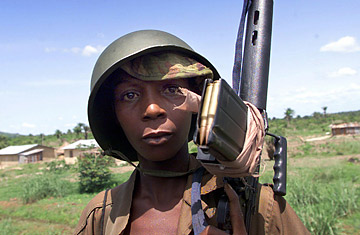
A child who was drafted into the Kamajors, the traditional hunters allied to the Sierra Leonean army, poses in a file photo taken May 13, 2000
As chief prosecutor for the Special Court for Sierra Leone, Stephen Rapp witnessed many firsts, including the first ever convictions for the recruitment of child soldiers and the first convictions for sexual slavery and forced marriages as crimes against humanity. Now he's joining the Obama Administration as ambassador-at-large for war-crimes issues and taking his pursuit of justice to the rest of the world.
Why does the U.S. need an ambassador-at-large for war-crimes issues?
This position was established during the second term of the Clinton
Administration. [It] was particularly needed in the '90s, when
we saw the beginning of international criminal tribunals for the first
time since Nuremberg, with the establishment of the International
Criminal Tribunal for the Former Yugoslavia and then the International
Criminal Tribunal for Rwanda, both with the support of the U.S. This
office focused on coordinating the cooperation that these tribunals
needed to bring people to trial.
The U.S. is yet to ratify the Rome Statute of the International Criminal
Court (ICC). How does your appointment further U.S. involvement with the
ICC and international law?
The decision about the ICC treaty has to be
made by the President of the U.S. In 2002, Congress passed the
American Service Member's Protection Act that prohibited U.S.
cooperation in the ICC in many areas. [There was a fear that
U.S. soldiers could be targeted in politically motivated
prosecutions.] But it also included a provision that U.S. authorities
could cooperate to bring to trial individuals like [former
Yugoslav President] Slobodan Milosevic. I think you can expect that the
current Administration won't go back on what the second Bush
Administration did after 9/11 with regards to unsigning the ICC treaty.
So the U.S. does not want its own citizens to be held accountable for
crimes in Afghanistan and Iraq?
In my point of view, if there were acts
of torture, they violated American law because America ratified the U.N
Convention Against Torture. If we were part of the ICC, we would be
expected to investigate these issues, and if there were a strong case,
you would expect prosecution. That's what the U.S. is doing anyway. We
respect one of the guiding principles of the ICC that the international
court has jurisdiction that is secondary to the national court. Whether
we are part of the ICC or not, we will conduct ourselves so that no
prosecutor at the international level would ever have cause to take up a
case against an American citizen.
Which countries do you hope to focus on?
There are situations that have
already been handed to us. There is a report from the Department of
State on the war in Sri Lanka due in Congress [on Sept. 21].
Additionally, the office, together with the Secretary for Global Affairs
and the Secretary of State, has the responsibility to collect
information on ongoing atrocities, and it is then the responsibility of
the President to determine what steps might be taken towards justice.
Like the canary in the coal mine, we give the signal that something very
serious is occurring.
Do the requirements of peace get in the way of justice?
I think we've
learned that contrary to fears, holding people accountable for
atrocities does not make the problem worse — it makes it better. When
Milosevic was indicted for ethnic cleansing in Kosovo, people were
convinced that they would never have peace and he would be worse than
ever. Within a short time he was charged and jailed in his own country.
In Sierra Leone there was a peace agreement that gave the rebels
amnesty, but that was not genuine peace. When the government said they
needed to try those that bore the greatest responsibility, that's what
hastened the end of that conflict. Justice is a necessary ingredient to
the establishment of peace. There's always an argument that justifies
doing nothing, but you can't defer it forever.
What problems came up in the pursuit of international justice in Sierra
Leone?
The concern all of us had was that we were conducting justice in
a comfortable courtroom with long trials and well-paid attorneys.
Prisoners had single cells, and they had committed the worst crimes. A
mile away in the local prison there were simply no resources. Cases
can't go forward, witnesses are lost, and people stay in detention for
many years at a stretch. [If I was] to do it over, I would try
to develop a court within the national system. That would be my
preference. Maybe not a court that costs $30 million a year like the
Special Court, but an appropriate court.
Does your remit restrict you to conflict zones, or can you focus on human-rights abuses in places like Burma and North Korea?
My job deals with
atrocities, genocide and war crimes. Human rights and international
humanitarian law are closely related, but my focus is on the latter.
I'll be working not just with new developments and existing courts but
also unhealed wounds created by past atrocities, in Cambodia for
instance.
With [special envoy] Scott Gration in Sudan and now you, is
there a trend toward diplomatic engagement with war criminals and the
systems that shield them?
We want genocide to stop but also want the
conflict to stop. Issues like contact with governments that have
committed these crimes always come up. We should have no nonessential
contact with indicted individuals. It is preferable to meet with people
who are not accused, but sometimes you need to have that contact. There
are different approaches that can be taken, but working that out is
something I look forward to doing.
